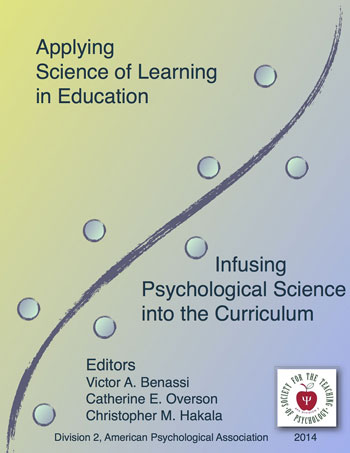- News
- asle2014
Applying Science of Learning in Education: Infusing Psychological Science into the Curriculum (2014)
DescriptionThis edited book represents a sliver, albeit a substantial one, of the scholarship on the science of learning and its application in educational settings. Most of the work described in this book is based on theory and research in cognitive psychology. Although much, but not all, of what is presented is focused on learning in college and university settings, teachers of all academic levels may find the recommendations made by chapter authors of service. Authors wrote their chapters with nonexperts as the target audience – teachers who may have little or no background in science of learning, research-based approaches to teaching and learning, or even general principles of psychological science. The book is organized in three sections. The 14 chapters in Part 1 address important concepts, principles, theories, and research findings, and applications related to the science of learning. The four chapters in Part 2 focus on preparing faculty to apply science of learning principles in their courses. Finally, the six chapters in Part 3 provide examples of research that have been done in real academic settings and that have applied one or more science of learning principles. "Best book on learning I've read this year." Mary-Ellen Weimer PsycCRITIQUES Review by Ernest T. Goetz Chronicle of Higher Ed Review by James Lang ISBN: 978-1-941804-29-2 Download e-book PDF (4 Mb)Once the file is open, you can use the bookmark panel in Adobe Acrobat Reader to navigate to the specific chapters. |
Table of ContentsAcknowledgments and Dedication About the Editors Table of Contents Introduction Part 1: Science of Learning - Principles and ApproachesPrior Knowledge is More Than Content: Skills and Beliefs Also Impact Learning When and Why Introducing Difficulties and Errors Can Enhance Instruction Expertise Reversal Effect and Its Instructional Implications Using Feedback to Promote Learning Research-Based Principles for Designing Multimedia Instruction Generating Active Learning Test-enhanced Learning Supporting Self-Explanation in the Classroom Potent Techniques to Improve Learning from Text Learning From Worked Examples: How to Prepare Students for Meaningful Problem Solving Spacing and Interleaving of Study and Practice How Accuracy in Students’ Self Perceptions Relates to Success in Learning Metacognition and Instruction Operation ARA: A Serious Game that Combines Intelligent Tutoring and Learning Principles to Teach Science Part 2: Preparing Faculty to Apply Science of LearningAssessing the Impact of Instructional Methods Applying the Science of Learning: The Cognition Toolbox Applying Evidence-Based Principles of Learning to Teaching Practice: The Bridging the Gap Seminar Helping Students to Get the Most Out of Studying Part 3: Putting the Science of Learning into PracticeThe Effects of Memory Retrieval, Errors and Feedback on Learning Applying Multimedia Principles to Slide Shows for Academic Presentation Student misconceptions: Where do they come from and what can we do? Examining the Benefits of Cumulative Exams Intervening on Behalf of Low-Skilled Comprehenders in a University General Chemistry Course The Influence of Guiding Questions on Skilled- and Less-Skilled Readers’ Understanding of Written Discourse FeedbackFeedback regarding the editorial content of this book or any of its essays should be directed toward the individual authors or the book's editors. They (authors and editors) are solely responsible for the substance of the text. Feedback regarding technical matters of formatting or accessibility of this text via the online environment of the Internet should be directed to the Internet Editor. If you have any complaints or difficulties in accessing these materials, be sure to provide as detailed a description of your problem(s) as you can; you should include information about the browser you are using (e.g., Firefox, Safari) and its version number well as the type of computer you are using and its operating system. Copyright and Other Legal NoticesThe individual essays and chapters contained within this collection are Copyright © 2014 by their respective authors. This collection of essays and chapters as a compendium is Copyright © 2014 Society for the Teaching of Psychology. You may print multiple copies of these materials for your own personal use, including use in your classes and/or sharing with individual colleagues as long as the author's name and institution, and a notice that the materials were obtained from the website of the Society for the Teaching of Psychology (STP) <http://teachpsych.org/> appear on the copied document. For research and archival purposes, public libraries and libraries at schools, colleges, universities and similar educational institutions may print and store in their research or lending collections multiple copies of this compendium as a whole without seeking further permission of STP (the editors would appreciate receiving a pro forma notice of any such library use). No other permission is granted to you to print, copy, reproduce, or distribute additional copies of these materials. Anyone who wishes to print, copy, reproduce, or distribute copies for other purposes must obtain the permission of the individual copyright owners. Particular care should be taken to seek permission from the respective copyright holder(s) for any commercial or "for profit" use of these materials. Suggested Reference FormatWe suggest that the overall text be referenced in this fashion: Benassi, V. A., Overson, C. E., & Hakala, C. M. (2014). Applying science of learning in education: Infusing psychological science into the curriculum. Retrieved from the Society for the Teaching of Psychology web site: http://teachpsych.org/ebooks/asle2014/index.php Individual chapters may be referenced in this fashion: Ambrose, S. A., & Lovett, M. C. (2014). Prior knowledge is more important than content: Skills and beliefs also impact learning. In V. A. Benassi, C. E. Overson, & C. M. Hakala (Eds.). Applying science of learning in education: Infusing psychological science into the curriculum. Retrieved from the Society for the Teaching of Psychology web site:http://teachpsych.org/ebooks/asle2014/index.php |

